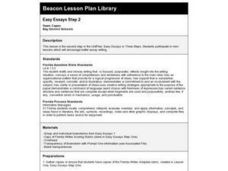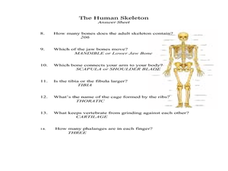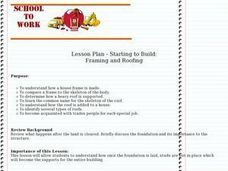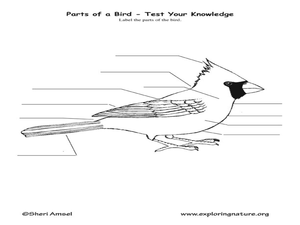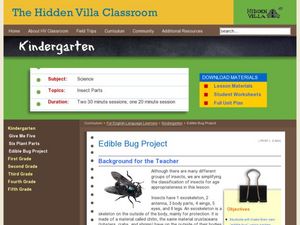Curated OER
Easy Essays Step 2
Third graders write essays after participating in mini-lessons that encourage better writing. They write using the model of a skeleton to which they add the muscles.
Curated OER
Dig This Dinosaur Relief Lesson
Students create low-fire ceramic relief sculptures of dinosaur bones. They incorporate art history, aesthetics, and criticism with hands on activity. Students work together to draw an enlarged skeleton on butcher paper. The Stegosaurus...
Curated OER
Fishes
In this fish worksheet, high schoolers will review the characteristics of fish by comparing the jaws, skeleton, and fertilization of each fish class. Then students will use a phylogenetic tree to compare the groups of fish to ancestral...
Curated OER
More Halloween Analogies
In this Halloween vocabulary learning exercise, students complete 7 analogies by writing the best word from 4 choices in the blank. All analogies pertain to Halloween.
Curated OER
Finding Facts
In this facts instructional activity, students use reference sources to respond to 5 multiple choice questions illustrating their knowledge of how to find facts.
Curated OER
EXPLORING OUR HUMAN BODIES
Students observe and investigate the human skeletal and muscle systems. They become aware of the versatility of movement as well as gain experience through the use of diagrams and hands on activities. An extensive vocabulary is covered...
Curated OER
The Leg Bone is Connected To The.... (a Look At the Skeletal System)
Students study the components of the skeletal system naming the bone groups that make up the appendicular and axial skeletal systems. They name the different layers of bone and the types of joints. They create an animated skeleton.
Curated OER
Starting to Build: Framing and Roofing
Students examine how a building's foundation is its frame and support system. They compare the frame of a house to the skeleton of the body. They draw roofs and select flooring.
Curated OER
Dig Magazine Archeology Quiz #106
In this Dig Magazine archeology quiz, students answer 12 multiple choice questions complementing the October 2009 issue. Page contains answer and additional resources link.
Curated OER
The Dinosaur Body
Young scholars investigate how body design affects balance. They make simple models of dinosaur bodies using straws and marshmallows. Before making their models, they discuss the effects of gravity and the importance of balance in body...
Curated OER
Ancient Creature of the Deep
Learners compare and contrast the coelacanth, a living fossil, with a moray eel and a bull shark. They complete a Fish Anatomy worksheet while researching the skeleton, body coverings and buoyancy of each fish.
Curated OER
Bones or No Bones?
Students move to music and study bones and their purpose. When the music plays slow, gentle sounds the students have NO bones and their bodies are like Jello or an egg that has been cracked open on the floor . When the music changes...
Curated OER
Learning Bird Traits
Students draw and label a bird. In this bird traits lesson, students learn what traits make a bird different from other animals. Students are taught how to draw a bird and are expected to label the various body parts they drew.
Curated OER
Bones in Your Body
In this bone identification worksheet, students label each bone in the picture with the words provided in the word bank. Students then cut out each bone and fit them together to make a skeleton.
IBM
The Human Body
Every moment, the systems in your body are working together to keep you breathing, standing, and thinking. Elementary schoolers explore the human body and its systems with an impressive, 15-page lesson plan that should leave your...
California Academy of Science
Human Evolution
As the great and hilarious Tim Minchin once said, "Science is simply the word we use to describe a method of organizing our curiosity." Science is more than just a guess; it is based on questions, observations, and evidence. High...
Curated OER
Edible Bug Project
Students recognize the characteristics of insects. In this edible bugs lesson, students observe the body parts of an insect. Students create an edible insect using a grape, carrot sticks and sorrel stems and leaves. ...
Curated OER
Bones Provide Great Support!
How do bones help people move around? A science investigation prompts kids to draw arrows to certain bones that protect their organs. After they finish, they trace their hands on a piece of paper and trace the way their bones go. Great...
Curated OER
Bite on This!
Different types of teeth have different roles. Third graders study how molars, incisors, and canines function in a rabbit skull and a cat skull. After answering some questions about the teeth of herbivores and carnivores, kids...
American Museum of Natural History
Create a Coral Reef
Scholars create a diorama to showcase a vibrant coral reef. Six steps walk pupils through setting up the diorama box, crafting four different types of marine life, and putting it all together.
Skyscraper Museum
What is a Skyscraper?
Skyscrapers are amazing feats of architectural design that create the iconic skylines of the world's biggest cities. Young architects explore the defining characteristics of these monstrous towers with the first lesson in this four-part...
Activated Story Theatre
Orpheus- A Greek Myth: Reader's Theatre Script
Is this any way to treat a Greek Myth? By all means, turn the tale of Orpheus into a reader's theatre exercise.
Calvin Crest Outdoor School
Survival
Equip young campers with important survival knowledge with a set of engaging lessons. Teammates work together to complete three outdoor activities, which include building a shelter, starting a campfire, and finding directions in the...
Howard Hughes Medical Institute
Stickleback Evolution Virtual Lab
How quickly do animals evolve? Can comparing different samples of the same fossil answer timeline questions? Scholars use virtual labs to examine fossils and learn about stickleback evolution. They compare pelvic morphology in lakes...


